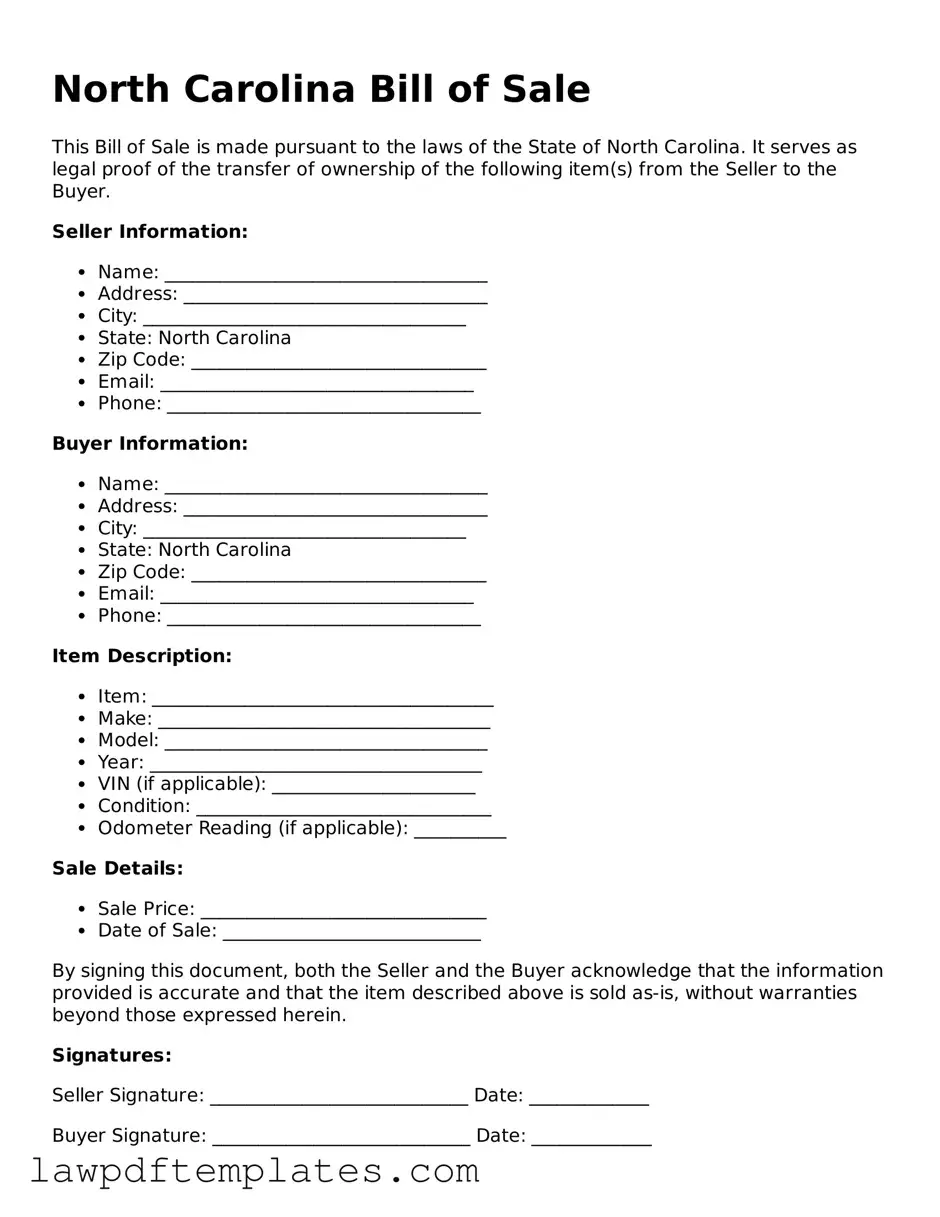Free Bill of Sale Template for the State of North Carolina
Form Breakdown
| Fact Name | Details |
|---|---|
| Purpose | The North Carolina Bill of Sale form serves as a legal document that records the transfer of ownership of personal property from one party to another. |
| Types of Property | This form can be used for various types of personal property, including vehicles, boats, and other tangible items. |
| Governing Law | The Bill of Sale in North Carolina is governed by the North Carolina General Statutes, specifically under Chapter 25, which pertains to the Uniform Commercial Code. |
| Requirements | While a Bill of Sale does not need to be notarized in North Carolina, it is advisable to include the signatures of both the buyer and seller to ensure clarity and legal standing. |
Sample - North Carolina Bill of Sale Form
North Carolina Bill of Sale
This Bill of Sale is made pursuant to the laws of the State of North Carolina. It serves as legal proof of the transfer of ownership of the following item(s) from the Seller to the Buyer.
Seller Information:
- Name: ___________________________________
- Address: _________________________________
- City: ___________________________________
- State: North Carolina
- Zip Code: ________________________________
- Email: __________________________________
- Phone: __________________________________
Buyer Information:
- Name: ___________________________________
- Address: _________________________________
- City: ___________________________________
- State: North Carolina
- Zip Code: ________________________________
- Email: __________________________________
- Phone: __________________________________
Item Description:
- Item: _____________________________________
- Make: ____________________________________
- Model: ___________________________________
- Year: ____________________________________
- VIN (if applicable): ______________________
- Condition: ________________________________
- Odometer Reading (if applicable): __________
Sale Details:
- Sale Price: _______________________________
- Date of Sale: ____________________________
By signing this document, both the Seller and the Buyer acknowledge that the information provided is accurate and that the item described above is sold as-is, without warranties beyond those expressed herein.
Signatures:
Seller Signature: ____________________________ Date: _____________
Buyer Signature: ____________________________ Date: _____________
Common mistakes
When completing the North Carolina Bill of Sale form, individuals often overlook important details that can lead to complications later. One common mistake is failing to provide accurate information about the buyer and seller. This includes names, addresses, and contact information. If any of this information is incorrect, it can create confusion and potential disputes in the future.
Another frequent error is neglecting to include a complete description of the item being sold. The Bill of Sale should contain specific details such as the make, model, year, and Vehicle Identification Number (VIN) for vehicles. For other items, including serial numbers or any distinguishing features is crucial. Without this information, proving ownership can become problematic.
People also often forget to indicate the sale price clearly. It is essential to state the amount being paid for the item. Leaving this section blank or writing it unclearly can lead to misunderstandings between the buyer and seller. Furthermore, it may affect tax obligations if the sale is not properly documented.
Another mistake is not having the document signed by both parties. A Bill of Sale is only effective when it is properly executed. Both the buyer and seller should sign and date the form to confirm their agreement. Without these signatures, the document may not hold up if any disputes arise.
Lastly, individuals sometimes fail to keep a copy of the completed Bill of Sale. It is important for both parties to retain a signed copy for their records. This document serves as proof of the transaction and can be vital in case of any future legal issues or questions regarding ownership.
Discover More Bill of Sale Templates for Specific States
Illinois Bill of Sale for Car - It is simple to complete and can save time and potential legal issues.
If you are looking for a straightforward way to document the sale of your personal belongings, a comprehensive guide to the General Bill of Sale can be very helpful. This resource outlines critical information that must be included in the transaction documentation, ensuring clarity and legal protection for both parties involved. For more insights, check out the essential General Bill of Sale template.
How to Sell Your Car Privately - It serves as documentation in case any legal issues arise later.
State of Georgia Bill of Sale - Ensure both parties retain their respective copies of the signed Bill of Sale for records.
